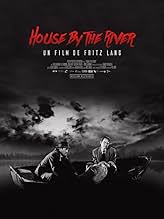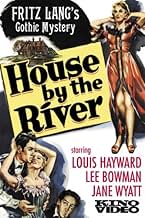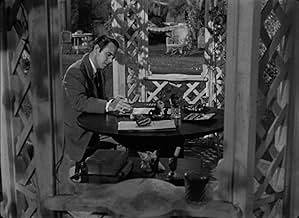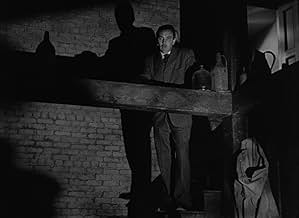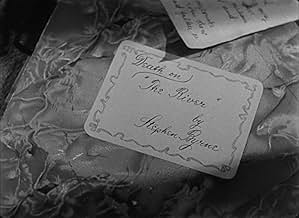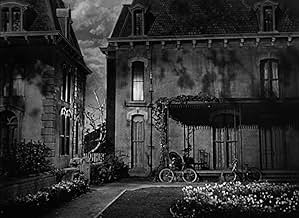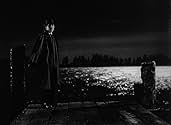IMDb-BEWERTUNG
7,0/10
4609
IHRE BEWERTUNG
Ein verwirrter Schriftsteller ermordet ein Dienstmädchen, nachdem sie sich seinen Vorschüssen widersetzt. Der Autor bittet die Hilfe seines Bruders, die Leiche zu verstecken, und beobachtet,... Alles lesenEin verwirrter Schriftsteller ermordet ein Dienstmädchen, nachdem sie sich seinen Vorschüssen widersetzt. Der Autor bittet die Hilfe seines Bruders, die Leiche zu verstecken, und beobachtet, wie der Bruder zum Hauptverdächtigen wird.Ein verwirrter Schriftsteller ermordet ein Dienstmädchen, nachdem sie sich seinen Vorschüssen widersetzt. Der Autor bittet die Hilfe seines Bruders, die Leiche zu verstecken, und beobachtet, wie der Bruder zum Hauptverdächtigen wird.
Bob Burns
- Courtroom Spectator
- (Nicht genannt)
Edgar Caldwell
- Square Dancer
- (Nicht genannt)
Edward Clark
- Minor Role
- (Nicht genannt)
Frank Dae
- Col. Davis
- (Nicht genannt)
Empfohlene Bewertungen
Failing novelist Stephen Byrne (Louis Hayward) murders his maid and manipulates his brother John (Lee Bowman) into helping him dispose of the body. Later, after it has been found, he sees a chance to pin the crime on John, whom he eventually tries to kill, too (making it look like suicide). 'House by the River' is suffering from one essential downside: The plot is illogical. While Stephen does everything to let suspicion fall on his brother, he is at the same time working on a new novel (following the advice of a neighbour to focus on things he knows) about a murder - a novel that is as good as an admission of guilt. And if he puts all this into that novel, which after all he intends to publish, why is he so desparate to prevent his wife Marjory (Jane Wyatt) from reading the manuscript? Despite all this, I am rating 'House by the River' 7 stars. That is because it is well-acted and beautifully photographed. Especially the eerie scenes on the river (with its murky and brackish water) are great. In sum, this is by no means one of Fritz Lang's best films, far from it. But it has some important points in its favour.
The unsuccessful writer Stephen Byrne (Louis Hayward) tries to force his servant Emily Gaunt (Dorothy Patrick) sexually while his wife Marjorie Byrne (Jane Wyatt) is visiting a friend and accidentally strangles her. His crippled brother John Byrne (Lee Bowman) coincidently comes to his house in that moment, and Stephen asks him to help to get rid of the corpse and avoid an scandal, since his wife would be pregnant. The naive and good John helps his brother to dump the body in the river nearby his house. Stephen uses the disappearance of Emily to blame her and promote his book. When the body is found by the police, all the evidences points to John, and he becomes the prime suspect of the murder.
"House by the River" is a dark and tense movie with one of the most despicable characters I have ever seen. Louis Hayward is perfect in the role of a scum, capable of killing, defaming, lying, falsely accusing, and maintaining cold blood. Jane Wyatt and Lee Bowman complete the efficient trio of lead cast. Fritz Lang uses with mastery the shadows and lights in the black and white cinematography as usual. The story is very tense, but the conclusion is very abrupt and quite conventional, moralist and commercial. In my opinion, this excellent film deserved a darker and amoral ending to become another masterpiece of this outstanding director. My vote is nine.
Title (Brazil): "Maldição" ("Curse")
"House by the River" is a dark and tense movie with one of the most despicable characters I have ever seen. Louis Hayward is perfect in the role of a scum, capable of killing, defaming, lying, falsely accusing, and maintaining cold blood. Jane Wyatt and Lee Bowman complete the efficient trio of lead cast. Fritz Lang uses with mastery the shadows and lights in the black and white cinematography as usual. The story is very tense, but the conclusion is very abrupt and quite conventional, moralist and commercial. In my opinion, this excellent film deserved a darker and amoral ending to become another masterpiece of this outstanding director. My vote is nine.
Title (Brazil): "Maldição" ("Curse")
House by the River (1950)
A straight up Gothic murder scenario with echoes of the 1945 "Spiral Staircase." A family with two brothers at odds with each other is living in a house and one of them is a murderer. And at first only the audience knows who. Their relative isolation on the banks of a wide river means only that they will have little help when danger occurs. The neighbors and police and few and far.
Louis Hayward plays the main character, Stephen Byrne, a writer and a bit of a self-important cad. Hayward has an odd style on film during this era, attractive and likable at first, but with an acerbic humor and some kind of unworkable stiffness, as if you know he's always performing. But he's clever about it, and when you realize he isn't meant to be exactly lovable, he's pretty well cast. Byrne's brother, wife, and maid all come through with solid if uninspired performances, and you wonder exactly what held everyone back. Fritz Lang has many more successful melodramas than this one.
I think the weakness is largely the raw material, the story itself, which is a bit straight forward. One brother commits a murder, the other is drawn into helping cover it up, and then the tensions build between them as an inquest raises questions. It has moments, but there are no further twists that work. The ending is out of character, almost comical in its false (and unlikely) horror.
Along the way, though, are a series of nice scenes, inside the house at night, along the river at night, at a party meant to hide the killer's guilt, and so on. The music is especially helpful in jabbing the audience at key moments. American Georges Antheil was a composer famous for his avant-garde pieces in the 1920s in Europe before settling into a Hollywood routine. You can detect, and appreciate, the edge he brings to the score. The photography by contrast is good without rising up to the possibilities of these kinds of settings--the house, the river, the dock, all have more dramatic potential that we just don't see.
A straight up Gothic murder scenario with echoes of the 1945 "Spiral Staircase." A family with two brothers at odds with each other is living in a house and one of them is a murderer. And at first only the audience knows who. Their relative isolation on the banks of a wide river means only that they will have little help when danger occurs. The neighbors and police and few and far.
Louis Hayward plays the main character, Stephen Byrne, a writer and a bit of a self-important cad. Hayward has an odd style on film during this era, attractive and likable at first, but with an acerbic humor and some kind of unworkable stiffness, as if you know he's always performing. But he's clever about it, and when you realize he isn't meant to be exactly lovable, he's pretty well cast. Byrne's brother, wife, and maid all come through with solid if uninspired performances, and you wonder exactly what held everyone back. Fritz Lang has many more successful melodramas than this one.
I think the weakness is largely the raw material, the story itself, which is a bit straight forward. One brother commits a murder, the other is drawn into helping cover it up, and then the tensions build between them as an inquest raises questions. It has moments, but there are no further twists that work. The ending is out of character, almost comical in its false (and unlikely) horror.
Along the way, though, are a series of nice scenes, inside the house at night, along the river at night, at a party meant to hide the killer's guilt, and so on. The music is especially helpful in jabbing the audience at key moments. American Georges Antheil was a composer famous for his avant-garde pieces in the 1920s in Europe before settling into a Hollywood routine. You can detect, and appreciate, the edge he brings to the score. The photography by contrast is good without rising up to the possibilities of these kinds of settings--the house, the river, the dock, all have more dramatic potential that we just don't see.
House By The River was a simple tale masterfully brought to the screen by Fritz Lang in his best conventional yet classy style. It was shot on a shoestring budget for Republic but a brooding atmosphere was captured beautifully by intelligent production and marvellous period sets on sharp nitrate film stock. Even the studio shot scenes of the garden with long shots of the bricky houses are fascinating to sink into.
Louis Haywood plays a budding writer with pretensions to Art and dubious morals who accidentally murders his lowly servant girl and drags his weaker brother into the mess to help him out. The story is simply played out to the bitter end, and although I wish the police angle could have been given more prominence it's completely logical. The part the River plays isn't as large as the House, but it's a darkly inspired mix; I've always wondered what colour the wallpaper was. Haywood often played ambivalent characters, however there's no ambivalence here in his portrayal of Stephen Byrne he's an evil swine all right. When it's all done you should be left with admiration for a director who could make a little go such a long way, with the help of a great team and cast of course!
It deserves more attention than it gets maybe the simple descriptive title didn't help it win immortality, otoh a more eye-catching "Strangled In The Dark" wouldn't have been as good either! This is one of those little films to treasure and something to revel in at the cinema or late at night on TV with the lights off for maximum effect.
Louis Haywood plays a budding writer with pretensions to Art and dubious morals who accidentally murders his lowly servant girl and drags his weaker brother into the mess to help him out. The story is simply played out to the bitter end, and although I wish the police angle could have been given more prominence it's completely logical. The part the River plays isn't as large as the House, but it's a darkly inspired mix; I've always wondered what colour the wallpaper was. Haywood often played ambivalent characters, however there's no ambivalence here in his portrayal of Stephen Byrne he's an evil swine all right. When it's all done you should be left with admiration for a director who could make a little go such a long way, with the help of a great team and cast of course!
It deserves more attention than it gets maybe the simple descriptive title didn't help it win immortality, otoh a more eye-catching "Strangled In The Dark" wouldn't have been as good either! This is one of those little films to treasure and something to revel in at the cinema or late at night on TV with the lights off for maximum effect.
House by the River is something of an anomaly; it's more of an old-dark-house Gothic than the grittier dramas, from Fury to Beyond A Reasonable Doubt, which Fritz Lang made in his American period. (The location of this house is a worrisome and amateurism anomaly, too; the conventions, milieu and some of the accents suggests that it's an English country estate, but much else argues that the film takes place in the U.S.) Would-be writer Louis Hayward, getting flirtatious with the maid in the absence of his wife (Jane Wyatt), accidently strangles her when she resists his advances. His brother (Lee Bowman) reluctantly agrees to cover up for him and help sink the body in the sinister, ever-present river that runs by the edge of the property; the resulting scandal of the disappeared servant bolsters the writer's flagging career. When suspicion begans to gather around his innocent brother, Hayward, by now seriously demented, couldn't be more pleased. But then Wyatt comes across a hidden manuscript; Hayward (you see), flushed by his phoney success, resolves to write "what he knows...."
Edward Cronjager's heavily shaded cinematography and Georges Anthiel's brooding score help fill out Lang's dark, clammy vision, making the river -- forever disgorging its flotsam and jetsam -- a principal character in the action. House by the River is a good old-fashioned thriller, particularly in its Gothic closing scenes, but it's not in a class with Lang's films at the top of his American form, like Scarlet Street, The Big Heat or Human Desire.
Edward Cronjager's heavily shaded cinematography and Georges Anthiel's brooding score help fill out Lang's dark, clammy vision, making the river -- forever disgorging its flotsam and jetsam -- a principal character in the action. House by the River is a good old-fashioned thriller, particularly in its Gothic closing scenes, but it's not in a class with Lang's films at the top of his American form, like Scarlet Street, The Big Heat or Human Desire.
Wusstest du schon
- WissenswertesFritz Lang originally wanted a black woman to play the role of Emily Gaunt, but the producers refused.
- PatzerThe women are dressed in turn of the century type clothing but the men are wearing modern hats and suits.
- Zitate
John Byrne: You must be very, very ill Stephen...
Stephen Byrne: Ill?
- VerbindungenFeatured in Le documentaire culturel: Das Verhängnis des Doktor Frankenstein (2018)
- SoundtracksTurkey in the Straw
(uncredited)
American folk song
Author unknown
Top-Auswahl
Melde dich zum Bewerten an und greife auf die Watchlist für personalisierte Empfehlungen zu.
- How long is House by the River?Powered by Alexa
Details
- Erscheinungsdatum
- Herkunftsland
- Sprache
- Auch bekannt als
- House by the River
- Drehorte
- Produktionsfirma
- Weitere beteiligte Unternehmen bei IMDbPro anzeigen
- Laufzeit
- 1 Std. 23 Min.(83 min)
- Farbe
- Seitenverhältnis
- 1.33 : 1
Zu dieser Seite beitragen
Bearbeitung vorschlagen oder fehlenden Inhalt hinzufügen


